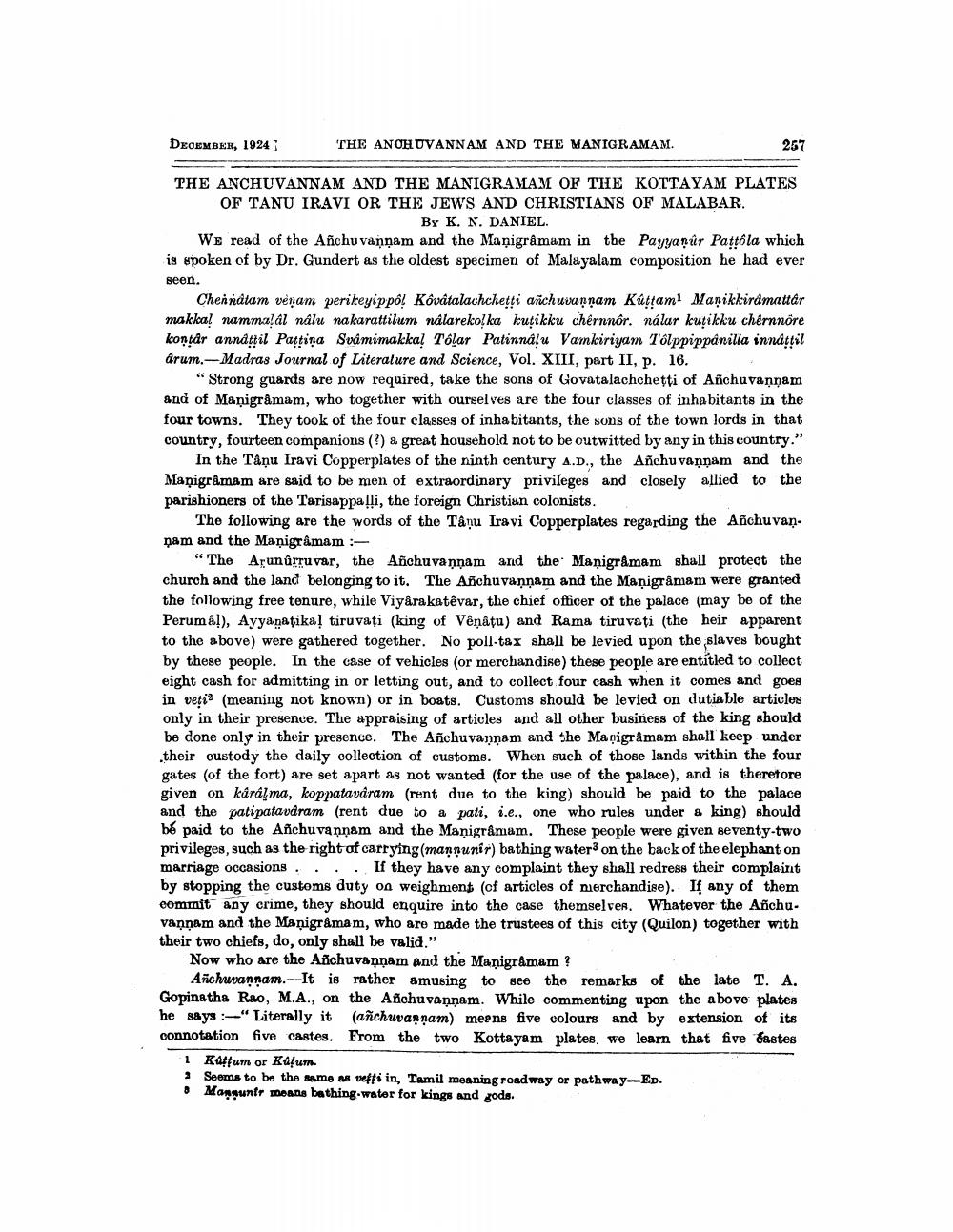________________
DECEMBER, 1924
THE ANCHUVANNAM AND THE MANIGRAMAM.
257
THE ANCHUVANNAM AND THE MANIGRAMAM OF THE KOTTAYAM PLATES OF TANU IRAVI OR THE JEWS AND CHRISTIANS OF MALABAR
By K. N. DANIEL. We read of the Anchy vanņam and the Manigrâmam in the Payyanur Pattóla which ig spoken of by Dr. Gundert as the oldest specimen of Malayalam composition he had ever seen.
Chennatam venam perikeyip pôl Kovátalachchetti anchuvannam Kúttam! Manikkiråmattar makkal nammal al nálu nakarattilum nalareko! ka kutikku chêrnnor. nálur kutikku chêrnnore kontar annáttil Pattina Svámimakkal Tólar Patinnálu Vamkiriyam T'ólppippanilla inndtil drum.-Madras Journal of Literature and Science, Vol. XIII, part II, p. 16.
"Strong guards are now required, take the sons of Govatalachchetti of Añchuvannam and of Manigramam, who together with ourselves are the four classes of inhabitants in the four towns. They took of the four classes of inhabitants, the sons of the town lords in that country, fourteen companions (?) a great household not to be outwitted by any in this country."
In the Tâņu Iravi Copperplates of the ninth century A.D., the Añchuvannam and the Manigramam are said to be men of extraordinary privileges and closely allied to the parishioners of the Tarisappalli, the foreign Christian colonists.
The following are the words of the Tänu Travi Copperplates regarding the Anchuvan. ņam and the Manigramam :
"The Arunurruvar, the Añchuvannam and the Manigramam shall protect the church and the land belonging to it. The Añchuvannam and the Manigramam were granted the following free tenure, while Viyarakatêvar, the chief officer of the palace (may be of the Peruma!), Ayyapatika! tiruvati (king of Vêņâţu) and Rama tiruvati (the heir apparent to the above) were gathered together. No poll-tax shall be levied upon the slaves bought by these people. In the case of vehicles (or merchandise) these people are entitled to collect eight cash for admitting in or letting out, and to collect four cash when it comes and goes in veţi? (meaning not known) or in boats. Customs should be levied on dutiable articles only in their presence. The appraising of articles and all other business of the king should be done only in their presence. The Anchuvannam and the Manigramam shall keep under their custody the daily collection of customs. When such of those lands within the four gates of the fort) are set apart as not wanted (for the use of the palace), and is therefore given on kärál ma, koppatavaram (rent due to the king) should be paid to the palace and the patipatavdram (rent due to a pati, i.e., one who rules under a king) should be paid to the Anchuvannam and the Manigramam. These people were given seventy-two privileges, such as the right of carrying(mannunir) bathing water on the back of the elephant on marriage occasions.... If they have any complaint they shall redress their complaint by stopping the customs duty on weighment of articles of merchandise). If any of them eommit any crime, they should enquire into the case themselves. Whatever the Añchuvaņņam and the Manigramam, who are made the trustees of this city (Quilon) together with their two chiefs, do, only shall be valid."
Now who are the Anchuvannam and the Manigramam?
Añchuvannam.--It is rather amusing to see the remarks of the late T. A. Gopinatha Rao, M.A., on the Añchuvannam. While commenting upon the above plates he says "Literally it (anchuvannam) meens five colours and by extension of its connotation five castes. From the two Kottayam plates, we learn that five tastes 1 Kafum or Kafum.
Seems to be the same as veffi in, Tamil meaning roadway or pathway-Ep. Mammunft moans bathing-water for kings and gods.




